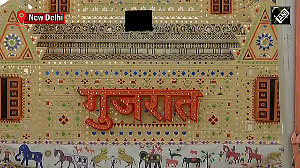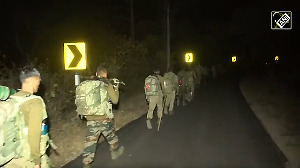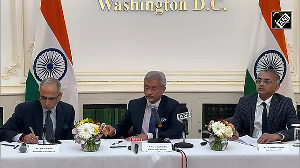Even as politics engaged him more, he never hid his way of life. On one occasion, Morarji Desai pleaded with him to stop drinking publicly. “You stick to your pissky and I’ll stick to my whisky’’ he is supposed to have told him.
Aditi Phadnis/Business Standard pays tribute to the noted jurist and the former union minister.

For many he was an utterly captivating, extraordinary character. For others, he was a source of constant trouble, a man who seemed to represent no moral principles, was politically unscrupulous and an intellectual dilettante. Ram Jethmalani, the most unpredictable of politicians lived a full life and died four days short of his 96th birthday.
There is little that is not known about his personal life. He started studying at Tekchand Pathshala, for which his father had to pay what in those days was a princely sum of Rs 4 a month. He completed school from Sukkur, Pakistan, at the age of 14 after getting several double promotions.
His biographer, Susan Adelman writes about Jethmalani’s naughtiness in school: "One day, when he was 14, the principal called all the students to come to the schoolyard at 1 pm. When they asked why, he said: 'I am going to thrash Ram Jethmalani for ruining the morals of the school'. It seems that Ram had asked the boys in his class what they did at night to amuse themselves in their rooms. They said they would usually read or study, and he said he would teach them something they could do by themselves that would be much more fun."
His father, ignoring his fascination for his grandfather’s vocation, the law, sent him first to study science and then engineering. Jethmalani was miserable. Finally, he joined the SC Shahani Law College in 1939 and graduated as a lawyer at 17 in 1941. He fought and won his case to be permitted to practice law -- not at 21 but at 18. It helped that he had got a first class first in law school. He began his law practice at 18.
At 18, he got married to Durga Ahuja, 16. Jethmalani shuttled between Bombay and Karachi as long as he could. But in 1947 when the killing started, he packed his family off and left Pakistan himself. He saw his family in a squalid refugee camp and resolved that he would never be poor again. He was to tell himself and his family that many times, later.
In Bombay, the family struggled to adjust. Jethmalani took on all the cases he could get: criminal, corporate (Sindhi bankers challenging foreign exchange laws lined up at the door when he won one case) and armed robbers and dacoits as well. He fell in love and married a second time while already married to Durga -- Ratna Shahani, herself a lawyer and later, his legal associate.
He took on a lot of refugee cases. This was par for the course -- Indians saw refugees as a nuisance and treated most of them like second class citizens. The law treated them no better. Ram Jethmalani fought for better laws not just for himself but for everyone else who had come to India in the hope of a better future mandated by the Constitution of India in 1950.
Then came socialist laws. The licence quota era of Nehru and later, Indira Gandhi, produced many economic deviants -- smugglers, etc -- who helped provide the well-heeled with the means and methods to support their lifestyle which the government deemed illegal. Naturally, they needed legal help. One of his colleagues described Jethmalani as the smugglers’ lawyer. Jethmalani told people: ‘when I see a man come into my office with his pockets bulging with smuggling money, I consider it my duty to relieve him of his wealth’. At one time, smugglers comprised 90 per cent of Jethmalani’s practice.
By now, his legal career -- specifically, criminal law -- was on a roll. But he could also see the roots of what was wrong with India. He targeted Nehru, for his pusillanimity on the war with China and attacked him vigorously.
Indira Gandhi and the Congress party were his next targets, especially after the Emergency was declared. Jethmalani was in political exile in the United States at the time, facilitated by friends: he drummed up support against the Emergency that culminated in Jimmy Carter becoming president and criticising the Emergency for suppression of liberty and freedom.
The first election Jethmalani fought was in 1971 from Ulhasnagar for its Sindhi population. He was supported by the Bharatiya Jana Sangh, the precursor of the BJP. He lost.
Meanwhile, laws like the Maintenance of Internal Security Act and others were keeping him extremely busy: not just because they targeted smugglers but also because they were being used against political opponents (the current government might want to study this phase of Jethmalani’s career). He was involved in the strategy session in the Kashavananad Bharati case and his broad argument went something like this: ‘The Supreme Court of Timbuktu has decided that a prostitute can be a virgin with retrospective effect’.
It was no surprise that Jethmalani contested the BombayNorth West seat in the Lok Sabha in 1977 and won by a huge margin. He lived on Janpath and soon had to put up a board outside his gate saying he had stopped accepting legal cases. Ninety per cent of his work was pro bono. Politics engaged him more and more but he never hid his way of life. On one occasion, Morarji Desai pleaded with him to stop drinking publicly. “You stick to your pissky and I’ll stick to my whisky’’ he is supposed to have told him.
The Congress returned to power in 1980. Jethmalani was elected to Parliament. In between he fought for smuggler Haji Mastan and suchlike. In 1988, he returned as Rajya Sabha member, with the help of Ramakrishna Hegde and Ramnath Goenka.
In the interim, he fought for and secured the acquittal of Sanjay Sinh and Amita Kulkarni Modi in the murder of badminton player and Amita Kulkarni’s first husband, Syed Modi; Kehar Singh and Satwant Singh convicted for Indira Gandhi’s assassination were defended by him -- and that was one of the cases he lost; former Khalistani secessionist and IPS officer Simranjit Singh Mann; He defended Afzal Guru and continued till his death, to be a lawyer for Asaram Bapu.
Along the way, Jethmalani collected friends, adversaries and political enemies. Whatever his views about them, he never minced his words. There can never be another Ram Jethmalani.












 © 2025
© 2025